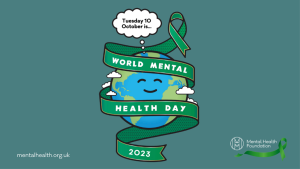World Mental Health Day 2023
Tuesday 10 October 2023
Last updated: Thursday 11 April 2024
World Mental Health Day, observed on October 10th each year, serves as a global platform to raise awareness about mental health issues and advocates for mental health as a fundamental human right. Organised by the World Federation for Mental Health, the day encourages individuals and workplaces to drive positive change around promoting mental health awareness.
Mental Health and Wellbeing
Our mental health is a journey marked by fluctuations and changes. At different points in our lives, we may all encounter moments when we feel blue, anxious, stressed, or distressed. Equally, circumstances and live events may occur, and our responses to these challenges may vary.
Good mental health is increasingly considered as an integral component of wellbeing, with research suggesting the importance of caring for our minds as we do our bodies. Yet, one in eight people worldwide lives with a mental health condition, and these conditions are particularly affecting a growing number of adolescents and young people (WHO, 2023).
So there is a lot more work to be done!

Theme: “Mental health is a universal human right”
This year’s theme emphasises mental health as a basic human right for all people. It stresses the importance of equitable access to the highest attainable standard of mental health for all, whoever and wherever they are.
Mental health experiences are unique to everyone. Those who are marginalised due to factors such as ethnicity, sexual orientation, gender identity, religion, or socio-economic status often face a greater likelihood of mental health challenges and reduced access to support.
In the UK, children from the poorest 20% of households are four times more likely to experience severe mental health difficulties by the age of 11 compared to their counterparts from the wealthiest 20% (Morrison Gutman et al., 2015). This disparity may arise from the stressful conditions associated with growing up in poverty, including financial instability, food insecurity, and a higher risk of exposure to traumatic events.
This year’s theme serves as a reminder that there’s still work to do to encourage more people to seek mental health support when they need it!
Tips for supporting and talking about mental health
Sharing how we feel
One of the most effective ways we can protect our mental wellbeing is with a network of consistent social support. It can take a lot of courage to confide in someone about how we’re feeling or what we’re finding hard, especially if we don’t usually do that kind of thing. However, beginning these conversations can help to overcome the stigma around sharing our emotions, and help to reduce the degree of vulnerability we feel.
- Share with someone you feel comfortable around and trust
Sharing how we feel can help us feel supported, but it can be difficult to start emotionally vulnerable conversations, and this requires a degree of trust in the other person. A good starting point may be reaching out to ask how someone else is doing – whether a colleague of a friend. This is the foundation of emotional sharing within a relationship, which can gradually develop into a supportive relationship with reciprocal sharing and support. - Use your own words
The Mental Health Foundation suggested explaining feelings or challenges in your own way can help us feel safer and less alone and change how we see and feel in the situation in ways that will help. - Think about the best place to talk for you
It may be helpful to choose a place where you feel comfortable to open up. This could be a quiet space where you won’t be interrupted, or during an activity if that makes you feel more comfortable.
‘Do one thing’ for your mental health
The mental health charity Mind suggests we each should try to ‘Do one thing’ for better mental health. Every little action which helps yourself and others to protect and maintain their wellbeing is a positive contribution!
Mind suggest that small changes to our everyday routines and actions can make a difference. This might be going for a regular walk to keep active, checking in with a friend you haven’t heard from for a while, or doing something creative.
Be kind and help create a better world
If you’ve experienced loneliness, you will know how much it helps to have even a small connection with another person. Exchanging a smile or friendly words can be reassuring and boost our mood.
If you’re uncertain about how to begin, consider initiating small yet impactful acts of kindness, like sharing a smile or offering a few kind words to someone. These gestures can brighten their day and also contribute to your well-being, as friendly interactions with others are essential for our mental health.
Actively engaging with others exposes us to other perspectives. While it can be challenging to envision the world through someone else’s eyes, this skill enables us to empathize with and support individuals with diverse experiences. This supports us to reflect more on our own perspectives and feelings.
Helpful strategies to help us take another’s perspective include:
- Imagine yourself going through the same experiences as the other person.
- Use your own past experiences that are similar to theirs to understand their situation.
- Apply general knowledge about how people tend to react in specific situations.
By modelling this to people around us, we help others, including family and colleagues, to take different perspectives and be psychologically flexible.

